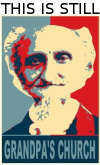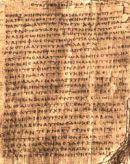- Sundays, Divine Service, at 10am
- Wednesdays in Advent at 7pm
- Wednesdays in Lent at 7pm

First President of the LCMS and it's Grandfather
CFW Walther
Who We Are
Christ Our Savior Lutheran Church is a Biblical, Confessional, Sacramental, Liturgical, Lutheran congregation.
Christ Our Savior Lutheran is Biblical, that is she preaches and teaches the Word of God. The Bible is the source of all of her proclamation. The Bible is without error because it is God-given, Spirit-breathed, and it is Truth. Because of this, it does not change, because God is the same yesterday, today, and forever (cf. Hebrews 13:8). The Bible teaches us that we are sinners in need of forgiveness, that all that we do is sinful and cannot measure up to God's demands and expectations but that Jesus and His death is the answer for those sins; this is the proper disctinction of the Law and the Gospel in the Bible.
Christ Our Savior Lutheran is Confessional, that is to say we same-say (as the word confess literally means) what the church of all times and all places has said. We make confession with the church when we speak and believe the three ecumenical creeds—the Apostles' Creed, the Nicene Creed, and the Athanasian Creed, as well as binding ourselves to the other Lutheran confessions as can be found in the Book of Concord (1580), namely the Augsburg Confession, the Apology to the Augsburg Confession, the Smalcald Articles, the Treatise on the Power and Primacy of the Pope, the Small Catechism of Dr. Martin Luther, the Large Catechism, and the Epitome and Solid Declaration of the Formula of Concord (these documents can be read at bookofconcord.org). These are right and true explanations of the inerrant Word of God.
Christ Our Savior Lutheran is Sacramental, meaning that she receives God as He has said He comes to us: in simple, ordinary means. Just as the Son of God took on flesh and was born of the Virgin Mary, so even now He comes to us in ways that we can see, feel, smell, taste, and hear. We Baptize with water and the Word. We celebrated the Holy Communion as we receive Christ's very body and blood truly present yet hidden in bread and wine. We receive Holy Absolution from God's called minister, placed in our midst, as if from the very lips of God Himself.
Christ Our Savior Lutheran is Liturgical, that is to say we use a formal and historic liturgy. We confess, pray, and sing things which have been confessed, prayed, and sung by Christians long before us, and will continue to be confessed, prayed, and sung by Christians long after us. More than tradition, the historic liturgy is filled with the Word of God, further proclaiming God's Law and Gospel; and so we confess, pray, and sing even as was confessed, prayed, and sung by people in the Scripture; these have been in use in the church since the early centuries.
Christ Our Savior is Lutheran!
Invitation
You are cordially invited to attend worship services with us. Everyone has a need to hear of their sins forgiven, and when you come to Christ Our Savior, you will hear of the Lord's death for the forgiveness of your sins.
However, visitors to Christ Our Savior must be aware of something: The Lord's Supper is celebrated every Sunday at Christ Our Savior (the Divine Service). Holy Scripture teaches that we receive Christ's true body and blood in the Lord's Supper, and that reception of Holy Communion is an expression of unity in doctrine [Matthew 26:28; 1 Corinthians 10:16; Acts 2:42]. Christ Our Savior Lutheran Church desires to uphold the integrity and respect for this Divine Sacrament, therefore we practice "closed communion." Guests who have not before communed at our altar by the hand of our pastor are kindly asked to talk to him before the service starts. Those who have not spoken to him before the service starts will not receive the Sacrament; however, anyone wishing to receive a blessing are invited to come to the rail and cross their arms over their chest.
Why "closed communion?" It is concisely summarized by Donald Deffner when he wrote:
So it is not that a Lutheran congregation wants to bar fellow-saints from the blessings of the Eucharist when they practice Close Communion. It is not that they want to be separatistic, or set themselves up as judges of other men. The practice of Close Communion is prompted by love and is born of the heartfelt conviction, on the basis of Scripture alone, that we must follow Christ's command. This means refusing the Lord's Supper to those whose belief is not known to us. It is not showing love to allow a person to do something harmful, even though he may think it is for his own good. It also means if they are members of a Christian body which departs from the full truth of Scripture in some of its doctrines, that we must not minimize the evil of this false teaching by opening our fellowship to any and all Christians who err in the faith.
For more information, please see 7 Myths of Close Communion.
About the Background

The image used as the background on this pages is a section of Papyrus 66, a near complete codex of the Gospel of John, and part of the collection known as the Bodmer Papyri. Most of what can be seen in the background is the first few verses of chapter one. A complete image of the first page of P66 can be seen to the right.
 : off-site link
: off-site link : pdf (Adobe Reader) document
: pdf (Adobe Reader) document : zip file
: zip file
 Like us on Facebook
Like us on Facebook Subscribe to our Youtube channel
Subscribe to our Youtube channel


